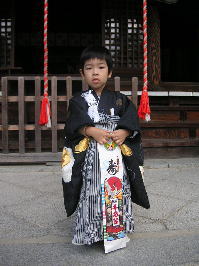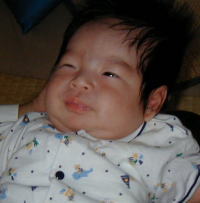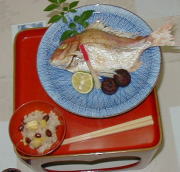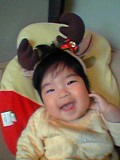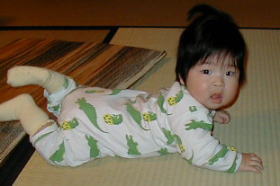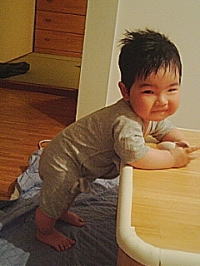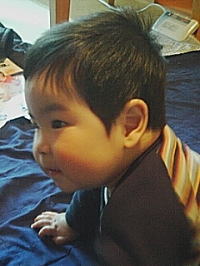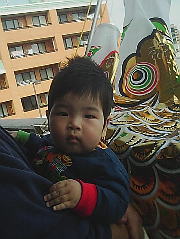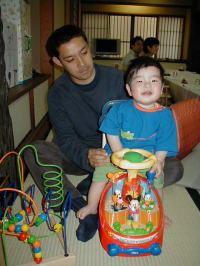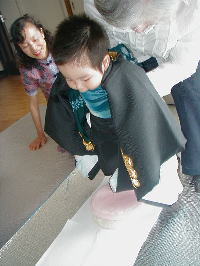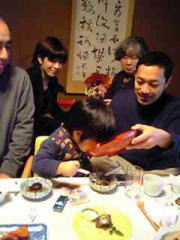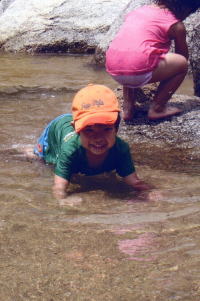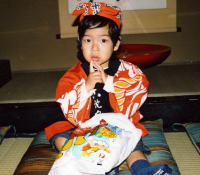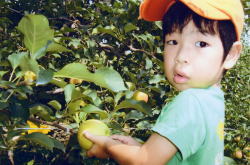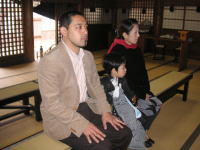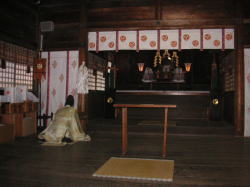|
|||||||||||||||||||||||||||||||||||||||||||||||||||
Seven-Five-Three (Shichi-Go-San) |
|||||||||||||||||||||||||||||||||||||||||||||||||||
| Hello! Do you know what Seven-Five-Three means? Hm, you think it is Haiku....... No, you are wrong. Haiku is Five-Seven-Five syllable's short poem. Somebody's size? NO. This is a name of a Japanese tradition. Well, please see Shichi-Go-San explanation from Wikipedia. |
|||||||||||||||||||||||||||||||||||||||||||||||||||
|
Shichi-Go-San Shichi-Go-San (七五三, literally "seven-five-three") is a traditional rite of passage and festival day in Japan for three and seven year-old girls and three and five year-old boys, held annually on November 15. As Shichi-Go-San is not a national holiday, it is generally observed on the nearest weekend. History Shichi-Go-San is said to have originated in the Heian Period amongst court nobles who would celebrate the passage of their children into middle childhood. The ages three, five and seven are consistent with Japanese numerology, which dictates that odd numbers are lucky. The practice was set to the fifteenth of the month during the Kamakura Period. Over time, this tradition passed to the samurai class who added a number of rituals. Children who up until the age of three were required by custom to have shaven heads were allowed to grow out their hair. Boys of age five could wear hakama for the first time, while girls of age seven replaced the simple cords they used to tie their kimono with the traditional obi. By the Meiji Period, the practice was adopted amongst commoners as well, and included the modern ritual of visiting a shrine to drive out evil spirits and wish for a long healthy life. Current practiceThe tradition has changed little since the Meiji Period. While the ritual regarding hair has been discarded, boys who are aged three or five and girls who are aged three or seven are still dressed in kimono - many for the first time - for visits to shrines. Three-year-old girls usually wear hifu (a type of padded vest) with their kimono. Western-style formal wear is also worn by some children. A more modern practice is photography, and this day is well known as a day to take pictures of children. ChitoseameChitoseame (千歳飴, Chitoseame), lit: "thousand year candy", is given to children on Shichi-Go-San. Chitoseame is long, thin, red and white candy, which symbolizes and ensures healthy growth and longevity. It is given in a bag with a crane and a turtle on it, which represent long life in Japan. |
|||||||||||||||||||||||||||||||||||||||||||||||||||
Thank you, Mr. Wikipedia, for explaining this for me. The reason why I mention Shichi-Go-San here is that we celebrated our grandson Asahi's Shichi-Go-San last month. Asahi is now three years old. He is a Boy now, not a baby. Time flies! It seems to me that he was born only yesterday. Please see Asahi's photo album. |
|||||||||||||||||||||||||||||||||||||||||||||||||||
|
|||||||||||||||||||||||||||||||||||||||||||||||||||
Thank you so much for your meeting Asahi. Asahi now loves cars, especially hard working cars like ambulance, fire engine, police car, dump truck, concrete mixer, even road sweepers. He already does computer and sees the toy car sites. He decides which one should join his collection next. Dad obeys him. Grandma believes he is a genius! If you are my friend, say you agree. Asahi and Grandma send you our love and greeting for the new year. We hope you will be as happy as we are! |
|||||||||||||||||||||||||||||||||||||||||||||||||||
|
|||||||||||||||||||||||||||||||||||||||||||||||||||
